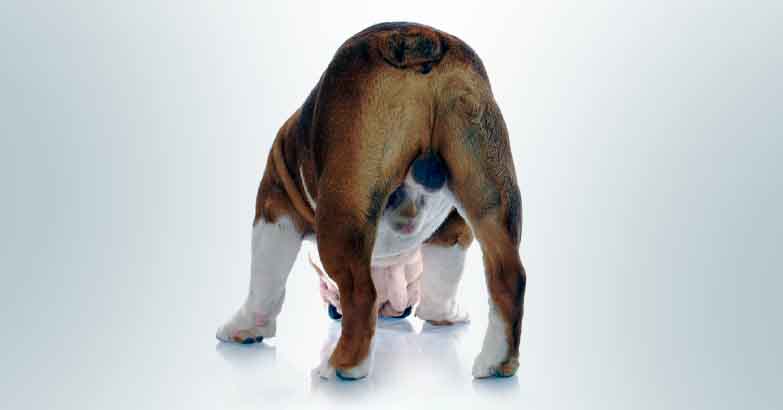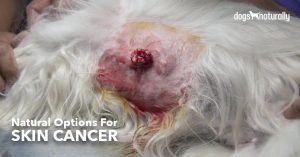Testicular cancer is a tumor that grows in an intact male’s testicles. Neutered dogs can’t get testicular cancer because their testicles and their cells have been removed.
How Common Is Testicular Cancer In Dogs?
Testicular cancer in dogs is relatively uncommon, representing about 4% to 7% of total canine cancers. However, rates may be going up. Necropsies of 232 dogs in 2008 found that the rate of testicular tumors in dogs had increased to 27%, from from 16% in 1962. The researchers suspected environmental pollutants were the reason for the increase over this 46 year period.
Testicular cancer is more common in dogs of 7 or older, and dogs over 10 years old have higher risk.
Dogs with cryporchidism (undescended testicles) are 13 times more likely to develop testicular cancer.
Types Of Testicular Cancer
The most common testicular tumors grow in 3 different types of cells in the testicles. About a third of dogs with testicular cancer have more than one type. Metastasis (spreading) is rare in canine testicular cancer. Testicular cancer may be linked to feminization due to overproduction of estrogen by tumors.
- Sertoli cells are where sperm develops. Sertoli cell tumors are especially common in dogs with undescended testicles, and can spread rapidly.
- Leydig cells produce testosterone, and dogs can develop interstitial tumors in these cells. These tumors often show minimal symptoms and they rarely spread.
- Seminomas/germ cells are tumors of normal sperm-producing cells. They are usually benign and unlikely to spread.
Rarer testicular tumors that are usually benign include fibroma, lipoma, embryonal carcinoma, hemangioma, teratoma, and chondroma. However, if these are malignant they can spread to lymph nodes, lungs, liver, or adrenal glands.
Dogs At Risk Of Testicular Cancer
Certain breeds have. higher risk of testicular cancer. These include Boxers, Afghan hounds, Collies, German Shepherds, Weimaraners, Shetland Sheepdogs and Maltese.
Dogs With Undescended Testicles
As mentioned earlier, cryptorchid testicles, when the testicles are undescended, are 13 times more likely to develop cancer. Besides the increased cancer risk, another reason to correct cryptorchidism is the risk of torsion or twisting … a very painful condition that usually requires emergency neutering.
The conventional treatment for cryptorchidism is also neutering … but there’s another treatment option that may help: homeopathy. There’s no specific remedy for cryptorchidism, but a professional homeopath can analyze your dog’s case and prescribe constitutional remedies that may resolve the problem.
Note: Cryptorchid dogs shouldn’t be used in breeding as it is likely a hereditary condition.
Symptoms Of Testicular Cancer In Dogs
If your male dog is intact, keep an eye on the appearance of his testicles, which can be one of the first signs of a problem. Here are some signs and symptoms of testicular cancer in dogs…
- A mass or lump in or on a testicle
- Swelling in one or both testicles
- Testicle skin discoloration
- Behavioral changes
- Penis atrophy and feminization, due to overproduction of estrogen by testicular tumor cells. Other feminization signs may be elongated nipples and breasts, squatting to pee, symmetrical hair loss, lack of sex drive, and male dog interest in your male dog.
Other non specific symptoms include general signs of illness like lack of appetite, lethargy or weight loss.
How Is Testicular Cancer In Dogs Diagnosed?
Your vet will do a physical exam to check for signs like swellings or a change in size or appearance of your dog’s testicles.
If she suspects testicular cancer, the next step is a scrotal ultrasound. Other tests may include complete blood count, urinalysis, x-rays, or CT scan.
Your vet may also recommend fine needle aspiration or biopsy to confirm the diagnosis. Many holistic vets will recommend against these procedures because needle insertion risks stirring up any cancer cells present and causing them to spread.
If you want to avoid these procedures, neutering your dog may be an option to consider. It’s also one of the most common treatment options for testicular cancer in dogs.
Treatment Of Testicular Cancer
As mentioned above, surgical removal of the testicles and tumor is a common solution. As long as the tumor hasn’t spread, it’s considered curative.
Risks of surgery include the risk of anesthesia, especially in an older dog, and there could be complications of anemia and bleeding if there’s bone marrow damage.
Other conventional treatment options include chemo and/or radiation. Your vet may recommend these if the tumor has spread beyond the testicles.
One study showed radiation of metastatic seminomas was effective. Another study (that included only 4 dogs) found that the chemotherapy drug cisplatin was effective, used in conjunction with castration. However, cisplatin is a dangerous drug …
Severe Side Effects Of Cisplatin
Cisplatin is a platinum-based chemo drug. It’s extremely potent and toxic, with a high risk of irreversible kidney damage, because it’s excreted in the urine. It’s also dangerous when combined with NSAIDs, so your dog shouldn’t take any anti-inflammatory drugs during cisplatin treatment.
It can cause hair loss, severe bone marrow suppression, permanent hearing damage and wobbly walking. Dogs will often suffer nausea and vomiting during the actual cisplatin treatment. If you do opt for cisplatin treatment, it’s said to be most effective when given between 4 and 6 pm.
However, there are many other chemo drugs too, so if you’re choosing conventional treatment, ask your vet about all the options and be sure to research side effects.
Holistic Treatment For Testicular Cancer In Dogs
When you’re looking for help with cancer treatment, you need to find a holistic practitioner who has experience in treating cancer. This might be a really skilled homeopath, herbalist (Western or Chinese) or other holistic vet, and preferably someone who’s already achieved results with other cancer cases
There are many natural treatment options that can preserve or even prolong your dog’s quality of life. Unlike conventional treatments, side effects are unlikely. You may consider a combination of options like …
- Western herbal therapies
- Chinese herbal formulas
- Homeopathy
- CBD
- Curcumin
- Medicinal mushrooms
- Mistletoe (studies show survival and quality of life benefits)
- Ozone therapy
Read more about natural cancer treatments for dogs …
Testicular Cancer Survival Rate
Testicular cancer is often successfully treated, as long as it’s caught early and hasn’t spread to other parts of the body. However it can be fatal if it’s not diagnosed and treated promptly, especially if there’s already damage to bone marrow cells. If testicular tumors have spread, the prognosis varies depending on the location, type of tumor and treatment choices.
References
Grieco V, Riccardi E, et al. Canine testicular tumours: a study on 232 dogs. J Comp Pathol. 2008 Feb-Apr;138(2-3):86-9.
Masserdotti C, Bonfanti U, De Lorenzi D, Tranquillo M, Zanetti O. Cytologic features of testicular tumours in dog. J Vet Med A Physiol Pathol Clin Med. 2005 Sep;52(7):339-46.
Peters MA, van Sluijs FJ. Testistumoren bij de hond: een literatuuroverzicht [Testicular tumors in dogs: a literature review]. Tijdschr Diergeneeskd. 1996 Jan 15;121(2):36-8.
Pecile A, Groppetti D, et al. Immunohistochemical insights into a hidden pathology: Canine cryptorchidism. Theriogenology. 2021 Dec;176:43-53.
McDonald RK, Walker M, et al. Radiotherapy of metastatic seminoma in the dog. Case reports. J Vet Intern Med. 1988 Apr-Jun;2(2):103-7.
Dhaliwal RS, Kitchell BE, Knight BL, Schmidt BR. Treatment of aggressive testicular tumors in four dogs. J Am Anim Hosp Assoc. 1999 Jul-Aug;35(4):311-8.









